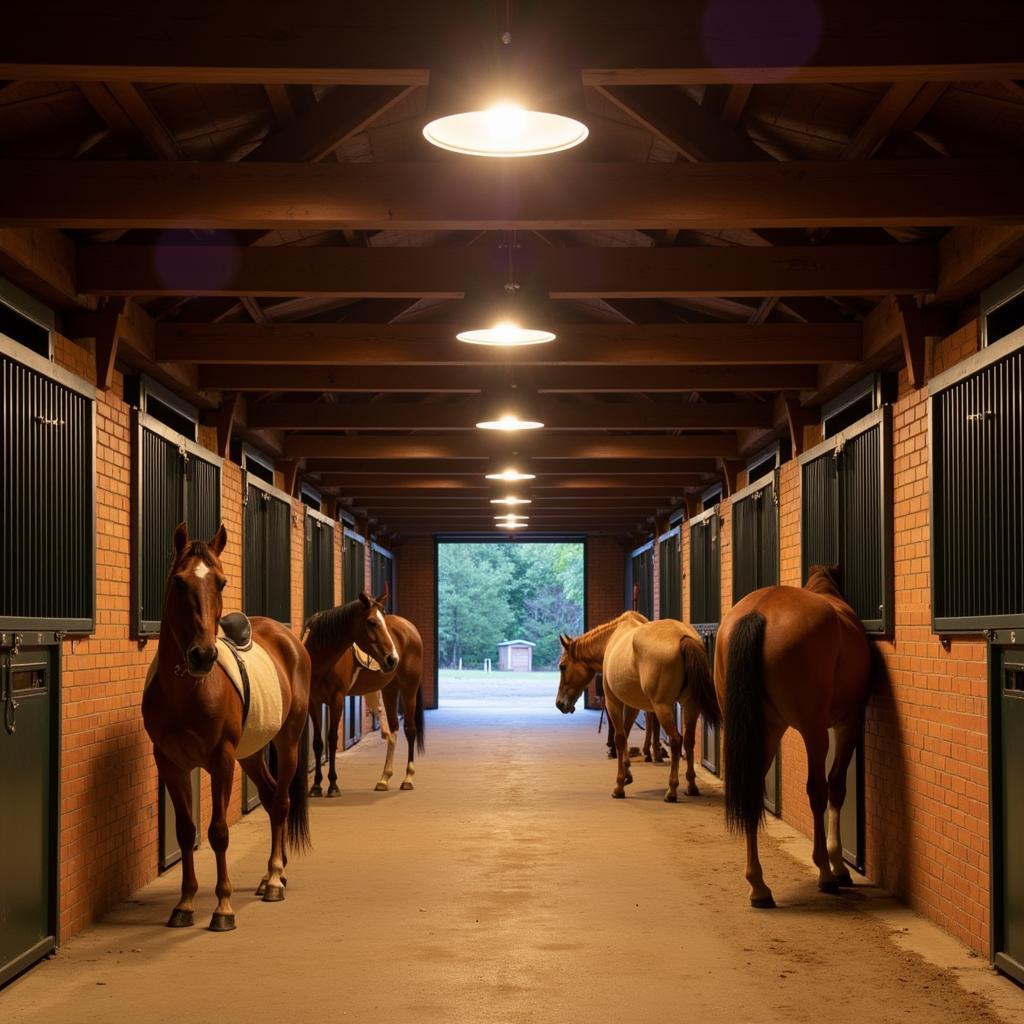Horse Light refers to the specific lighting requirements necessary to maintain optimal health and well-being for horses. While often overlooked, providing adequate and appropriate lighting can significantly impact your horse’s behavior, mood, and overall health. Just like humans, horses rely on a consistent light-dark cycle to regulate their circadian rhythm, which affects various bodily functions, including hormone production, sleep patterns, and even coat shedding.
The Importance of Natural Light for Horses
Horses thrive in natural light. Their eyes are designed to function best in bright conditions, allowing them to graze effectively and navigate their surroundings. Exposure to natural sunlight helps horses synthesize vitamin D, crucial for calcium absorption and bone health. Moreover, natural light plays a vital role in regulating their melatonin production, a hormone that governs their sleep-wake cycle and influences their seasonal behaviors, such as breeding and shedding.
The Impact of Artificial Light on Horses
 LED light fixtures illuminating a horse stable
LED light fixtures illuminating a horse stable
While nothing can truly replace the benefits of natural sunlight, providing appropriate artificial lighting in stables and barns is essential, especially during the shorter days of winter or in situations where natural light is limited. Artificial light can help maintain a consistent light-dark cycle, which is crucial for regulating your horse’s circadian rhythm. Disruptions in this natural cycle can lead to various health problems, including decreased fertility, hormonal imbalances, and even compromised immune function.
“Just like humans can experience winter blues, horses too can be affected by the lack of sunlight during the shorter days,” says Dr. Emily Carter, a veterinarian specializing in equine care. “Providing them with adequate artificial light can make a significant difference in their overall well-being.”
Choosing the Right Lighting for Your Horse
Selecting the right kind of artificial light for your horse’s environment is essential. Avoid dim lighting, as it can strain their eyes and make it difficult for them to see properly. On the other hand, extremely bright or glaring lights can be stressful and disorienting. Here’s a breakdown of common lighting options:
- Incandescent bulbs: These are the most traditional option but are being phased out due to their energy inefficiency and short lifespan.
- Fluorescent tubes: These provide brighter light than incandescent bulbs and last longer. However, some horses find the flickering associated with some fluorescent lights bothersome.
- LED lights: This is the most energy-efficient and long-lasting option. LED lights come in various color temperatures, allowing you to choose the most suitable option for your horse’s needs.
“When choosing lighting for your horse’s stable, consider the color temperature,” advises Dr. Carter. “Warmer lights, closer to natural sunlight, are generally more relaxing for horses, while cooler lights can be used in areas where you need brighter illumination for tasks like grooming or medical checks.”
Safety Considerations for Horse Lighting
- Ensure all wiring is properly installed and maintained to prevent fire hazards.
- Use shatterproof light covers to protect your horses from broken glass in case of accidents.
- Install lights out of your horse’s reach to prevent them from chewing on cords or fixtures.
- Consider using motion-activated lights to conserve energy and minimize light pollution.
Conclusion
Providing adequate and appropriate horse light is crucial for your horse’s well-being. By understanding their natural lighting needs and making informed choices about artificial lighting, you can contribute to their overall health, happiness, and performance. Remember, investing in proper horse light is an investment in your horse’s long-term health and well-being.
FAQs about Horse Light
- Do horses need light at night? While horses don’t need bright lights at night, providing dim lighting can be beneficial for safety reasons, especially if you need to check on them during the night.
- Can I use red light bulbs in my horse’s stable? Red lights are often marketed as being less disruptive to a horse’s sleep. However, there’s no scientific evidence to support this claim, and some horses may find red light unsettling.
- How many hours of light do horses need per day? Horses need a minimum of 10-12 hours of light per day, ideally a combination of natural and artificial light.
For any assistance, please contact us at Phone Number: 0772127271, Email: [email protected] Or visit us at QGM2+WX2, Vị Trung, Vị Thuỷ, Hậu Giang, Việt Nam. We have a 24/7 customer support team.